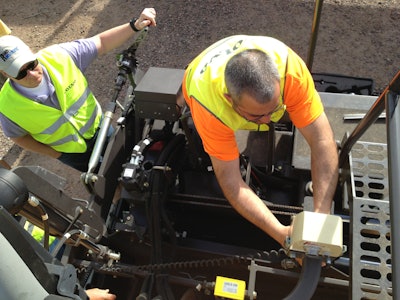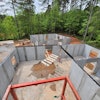
In 1991, when Mike Escher first founded M.C.E. Dirtworks, the majority of his jobs involved labor-intensive work by hand, completed under the blistering summer sun. The words ‘one step at a time’ became a personal mantra.
By 1993, Escher purchased his first skid steer loader. The steady work and same dogged work ethic continued, and in 1995, M.C.E. Dirtworks had its first asphalt paver. One job at a time, Escher continued to grow his business, and grow his team.
An important element of ensuring steady work meant growing the business strategically, as well. While M.C.E. Dirtworks focuses primarily on asphalt paving jobs, Escher made the determination to diversify as the company grew, expanding to cover demolition, septic work, landscaping and snow removal services.
Diversification and hard work kept M.C.E. Dirtworks climbing, and 20 years in, Escher continued to employ the same method regarding client calls as he did on Day One; never screening a job before he saw the site, and answering every potential client call. Every job possibility presented an opportunity. Every call possessed potential.
Unexpected opportunity
In the summer of 2012, however, an unexpected opportunity arose.
Meika, Escher’s wife, who plays an important role in the business, touching every element from client communications to invoicing, also works to stay on top of industry news. She’d seen a contest from Volvo Construction Equipment offering a chance at winning two free student registrations to the Volvo Road Institute, and she’d entered M.C.E. Dirtworks. And, she found out they’d won.
Founded nearly 50 years ago, the Volvo Road Institute offers two- to five-day training sessions to those in the asphalt and paving industry, combining classroom-style and hands-on learning in a variety of focus areas, including asphalt paver and compactor operation, maintenance and applications; screed operation; soil compaction operations; and automatic grade and slope control systems.
“Honestly,” Mike laughs, “One of my first thoughts when Meika told me we’d won the contest was, ‘it’s going to be hard to get away.’ You’ve got so much going on; you’re trying to meet the needs of all these jobs. But the thing is, you meet a lot of people who are in the industry long enough that they make assumptions that their way is the right way — that they know all they can know about how to get the job done. I never want to be that guy. The day you think you know everything there is to know about paving is the day you should retire. You can always learn something. So, I cleared the schedule for a few days, and my foreman and I headed to Road Institute.”
The duo attended a four-day course titled Paver and Compactor Operation and Maintenance at the Road Institute training facility in Phoenix. The sessions involved a balance of classroom-style and hands-on learning. Classroom-style sessions covered a variety of topics, from paver preparation and maintenance to grade control, and students were encouraged to bring their personal experiences and questions to the table. Extensive time was also spent in hands-on learning sessions at a practice site at the facility. During the hands-on sessions, each student had the opportunity to participate in every role on a paving team, from operating the paver and compactor, to managing the screed, asking questions of the instructors along the way.
Looking back, Escher says he couldn’t be more grateful they cleared their schedule.
“I can’t say enough about what I learned at Road Institute,” Escher says. “And I wasn’t an easy student — I threw every question I had at the instructors. The great thing about it is, these instructors aren’t just up there speaking from a podium. They’ve been out on jobsites. They’ve operated the equipment, they know what it’s like to talk with a customer who wants a job done a certain way. The fact that they can pair the detailed knowledge of the machines and applications with real-life experience is so valuable.”
Hands-on learning
Escher says another valuable element of Road Institute was the opportunity to balance the classroom-style learning with the hands-on sessions in the afternoon.
“There were times we’d learn a new technique in the morning session, and you’d want to get your hands on the machine to see just how it would apply — it worked great, because we’d head straight out to the practice site in the afternoon where we could do just that.”
Wayne Tomlinson has been involved in the construction industry for 25 years, the last 10 of which he has served as an instructor for the Volvo Road Institute. He says watching the students interact and work as a team in the afternoon sessions is one of the most gratifying experiences he has as a teacher.
“When you go out on the practice site, and you hear the students helping one another with information they learned that day, saying things like ‘you need to balance out your head of material,’ or ‘our grade’s too steep’ — that’s the best part, because then you know it’s sinking in, and these are things they’re going to take home to their paving jobs, that they’re going to teach to other teammates. Those are the things that are going to get their jobs completed even faster, even better.”
The interaction with the other students was one of the elements Escher says he found incredibly valuable, as well.
“Everyone brings their own experiences to the class,” Escher says. “That was helpful, too. Meeting people who, when you ask a question about a particular challenge you’re having on a job, nod their heads, like, ‘hey, we have that issue, too’.”
Chris Connolly, who instructs Volvo Road Institute alongside Tomlinson, says those types of situations are what help make the classes most meaningful and relevant to the students.
“I know exactly what it’s like to be in these students’ seats,” Connolly says. “I spent nearly 15 years as a working superintendent of a paving crew, and I know first-hand every job brings its own set of unique challenges. We don’t just help students by applying the knowledge Wayne and I have gained in the field, we apply the knowledge thousands of students who have attended Road Institute have provided one another along the way, as well.”
Escher says those unique challenges that arise on jobsites are going to be handled more easily and with more confidence now that he’s attended Road Institute. The difficult thing, he says, is picking the lesson that he thinks will prove most valuable as he moves forward in his operation.
“We learned so much. The focus on paver preparation — everything that needs to happen before you start rolling — was incredibly valuable. And paver maintenance — that’s going to help our paver stay in operation longer. I also appreciated the focus on safety. You get to doing something so long —so many times — it’s easy to get complacent, but every time we were out in that practice site, the instructors wouldn’t let us move an inch off a machine if we weren’t in a three-point stance. Those are great reminders … all of it… everything we touched on is going to make me a better boss and my foreman a better foreman.”
Identifying what he was most grateful for in his attendance was easy, Escher says —the instructors’ true desire to help.
“They didn’t hesitate to stay late if I thought of a question at the end of the day,” Escher says. “Not only that, they even offered to come visit one of my jobs; offered to come by, see how we were applying what we learned, see where we’re still having challenges — how we can improve. That’s incredible.”
When the session came to a close, and Escher returned home, he says one of the first things he did was to pull his Road Institute handbooks from his luggage and take them to work — sharing the information he learned with all of his team members.
“We all had the opportunity to learn from Road Institute,” Escher says, “And the jobs we’ve completed since my foreman and I attended, they’ve been completed more safely, and to an even higher level of quality than those we completed before.”
And now, the company Escher created more than two decades ago with a straightedge and determination is expanding yet again, as he says his team is beginning to take on bigger paving jobs.
And the story of M.C.E. Dirtworks’ growth continues.
One step at a time.















